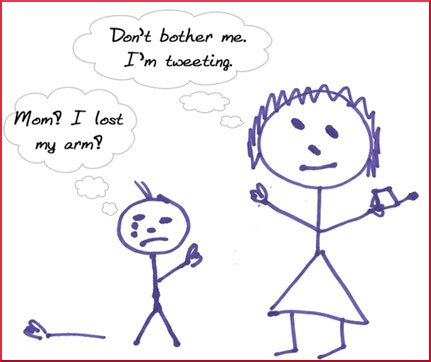
Yesterday, Childhood Obesity News mentioned research by a Washington State University student that showed:
…[M]oms who eat in response to their emotions or who are easily tempted by the sight, scent or taste of food had children with a strong desire to eat.
If you believe, as Dr. Pretlow does, that some people can become as addicted to food as others are to hard drugs, this is not a positive scenario. When children see grownups derive emotional solace from eating, it’s not that different from seeing the grownups take too many drinks, or inject heroin. There may be a difference of kind, but not of degree. Slavery to any substance is not the optimal way to live a life.
And what about objects? We have heard a lot from the media about electronic gadgets, in the context of use by children and teens. Sitting around too much, watching TV or playing video games, kids fall into the well-known and regrettable sedentary lifestyle, which makes it so easy to pile on the pounds.
But what about the gizmos used by prospective mothers before their babies are even born? Does in utero exposure to magnetic fields increase the risk of childhood obesity?
Apparently, the answer is yes, according to De-Kun Li and others members of his Kaiser Permanente research team who looked into this question. What made them suspicious? Several earlier studies that pointed to electromagnetic fields (EMFs) as a culprit in asthma, diabetes, and even Attention Deficit Hyperactivity Disorder.
Glucose metabolism is definitely affected. The report says:
A recent publication in Scientific Reports showed that in utero exposure to radio frequency EMF in mice could adversely impact neurological development in offspring. Therefore, it is biologically plausible that in utero MF exposure have an adverse effect on fetal development including the metabolic and endocrine systems. Damaged metabolic and endocrine systems could lead to childhood obesity.
… [W]e also observed a statistically significant interaction between the MF effect and two other risk factors for childhood obesity: maternal high BMI and pre-existing or gestational diabetes. Both maternal high BMI and diabetes are known risk factors for childhood obesity/overweight, and the association between in utero MF exposure and childhood obesity was much stronger in the presence of these known risk factors.
Basically, this research team found that medium to high exposure to EMFs before birth appears to result in a 69% increased risk of overweight and/or obesity for the child. That is a fairly large number and perhaps worth paying attention to.
Meanwhile, expectant mothers are advised to stay at least two or three feet from not only microwave ovens that are in use, but to keep the same distance from such mundane objects as hair dryers and vacuum cleaners that are powered on. Cell phones and cordless phones are not recommended, but if a cell phone must be used, a purse is a better place for it than a pocket next to the body. And laptop computers, despite their friendly name, should not be used on a lap but instead on a table.
Your responses and feedback are welcome!
Source: “A Prospective Study of In-utero Exposure to Magnetic Fields and the Risk of Childhood Obesity,” Nature.com, 07/27/12
Source: “New Ways to Prevent Childhood Obesity,” NewParent.com
Image by Colleen.

 FAQs and Media Requests:
FAQs and Media Requests: 











